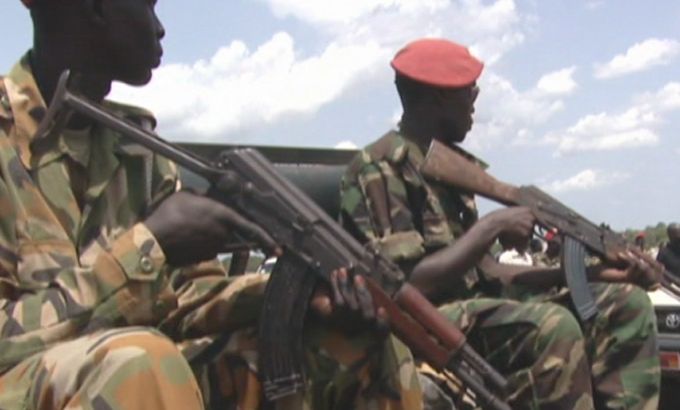South Sudan accuses Sudan of bombing Heglig
Government spokesman says attacks have caused serious damage to oil-producing area claimed by both countries.

South Sudan has accused its northern neighbour Sudan of bombing a disputed major oil field “to rubble”.
Barnaba Marial Benjamin, a spokesman for South Sudan’s government, told reporters in the capital Juba on Sunday that the aerial bombardment of the facility, located in the Heglig region, had caused serious damage.
“They are bombing the central processing facility and the tanks to rubble as we speak,” he said.
Sudan denied the claim and said it would not negotiate until the South withdrew all its troops from Heglig.
Earlier, Juba denied that Heglig had been reclaimed by Sudanese forces, saying that its army was still in control of the town.
Sudan had earlier said that it had taken back control of the oil town, which provides half of its oil needs.
Colonel Philip Aguer, South Sudan’s military spokesman, said on Saturday that southern forces did not plan to give up the town, which lies along the ill-defined border between the two Sudans.
But a Sudanese army spokesman insisted troops from the north were in Heglig.
“We are now in Heglig region a few kilometers from Heglig town and oilfield,” Al-Sawarmi Khalid said, adding that fighting was continuing.
South’s ‘war machine’
Khalid said the Sudanese army’s immediate aim was not to enter Heglig town but to destroy the South’s “war machine”.
Limited access to the remote border region makes it difficult to independently verify claims from both sides.
South Sudan has accused the North of carrying out airstrikes south of the border, including a strike in Bentiu, in Unity state, in which five civilians have reportedly been killed.
“The Sudanese Armed Forces are conducting indiscriminate air bombardment by Antonov jetfighters, indiscriminate bombing of Heglig, bombing of oil installments,” Aguer said.
“They tried to attack our positions around 65km north of Heglig last night but it was contained,” he said.
Barnaba Marial Benjamin, the South Sudanese government spokesman, said they had called on the UN Security Council and the African Union [AU] to step in.
They needed “to ensure Sudan ends immediately the atrocities and the senseless killings of innocent civilians”, Benjamin said.
Khartoum has denied bombing Southern territory.
South Sudanese troops wrested control of the disputed Heglig oilfield from Sudan on Tuesday, prompting widespread international condemnation, including by the AU.
The UN Security Council has demanded the withdrawal of South Sudan’s military forces from Heglig. It has also urged Sudanese President Omar al-Bashir and his southern counterpart, Salva Kiir, to hold talks to resolve their conflicts.
The South says it will withdraw from Heglig only if the UN deploys forces to monitor a ceasefire.
Close to conflict
The fighting has brought the former civil war foes closer to a resumption of full-blown conflict than at any time since South Sudan seceded in July last year under a 2005-peace accord.
Most of the oil resources ended up with the South, an outcome that struck a blow to Sudan’s oil-reliant economy, which saw the cost of imports going up and a rise in inflation.
Production has stopped at Heglig oil field, which is vital to Sudan’s economy as it produced about half of the country’s 115,000 barrel-a-day crude oil output.
Landlocked South Sudan shut down its own output, about 350,000 barrels a day, in January after failing to agree how much it should pay to export crude via pipelines and other infrastructure in Sudan.
The crisis has all but killed hopes that the two countries will be able to reach a swift agreement on partition-related issues through AU-brokered talks.
Sudan pulled out of the negotiations after the South seized Heglig, as the two sides continued to fail to resolve issues including the position of the 1,800km border, division of the national debt and status of citizens in each other’s territory.